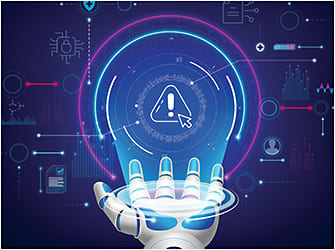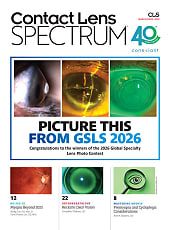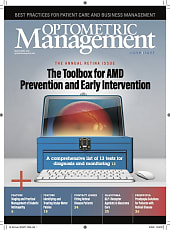To kick off our Technology issue, we invited Scot Morris, OD, to write an opinion piece about how artificial intelligence might shape eye care. Dr. Morris is chief development officer of Augmented Medical intelligence, Inc., and clinical director of Eye Consultants of Colorado, in Conifer, Colo. Dr. Morris served as chief optometric editor of Optometric Management from 2012 to 2018.
Artificial Intelligence (AI) has been making its mark across various industries, and the eye care industry is no exception. However, we are still in the early stages of eye care AI.
Here, I discuss both the rewards AI offers and the possible risks associated with it.
AI: THE REWARDS
The use of AI in eye care has the potential to improve diagnostic accuracy, efficiency, and patient outcomes, while also personalizing care and reducing healthcare costs. AI algorithms can analyze large amounts of data from retinal images, identifying patterns and changes that may indicate the presence of diseases, such as diabetic retinopathy1 and macular degeneration,2 much earlier than currently possible. Moreover, in the near future, AI algorithms will be able to analyze a patient’s condition, medical history, and other factors to personalize treatment plans.
Chatbots and other scheduling technology are already improving efficiency, freeing up time for other tasks and reducing human workload; we use AI for such tasks all day at my practice. AI technologies, such as ChatGPT, will also enhance the health care experience by providing patients and providers alike with 24/7 access to information via virtual assistants, thereby reducing the need for phone calls and in-person visits.

AI: THE RISKS
AI does not come without its challenges, though. The initial concerns revolve around reliability of the algorithms used, as it takes large amounts of time and data to build and train algorithms. Within a short period, these biases and inaccuracies will be eliminated by the sheer volume of data that can be analyzed. There are also concerns that algorithms will reflect already-existing human biases, since humans are feeding the algorithms the data.3 Second is the concern about equal access, but that will likely be minimal since over 75% of the world’s population currently has access to a smartphone.4
Finally, some have ethical concerns about data privacy violations. A 2021 article from BioMed Central Medical Ethics notes that recent AI research partnerships between health care and the private sector have resulted in poor patient privacy protection, and that steps must be taken to guard against the growing risk of cyber attacks on health care practices.5 This may easily be overcome in the future by ensuring proper steps for data security or anonymizing patient data. (For more information on cyber attacks in the eye care field, see “Protect Your Practice Against Data Breaches,” page 31.)
AI’S INCREASING ROLE
If you’re still skeptical about AI’s place in society, consider this: Much of this article was written by ChatGPT. While some proofreading and other additions, such as citations, were needed from OM’s editors, this technology is further along than many realize.
Despite challenges, the potential benefits make it likely that AI will play an increasingly important role in eye care. As such, health care professionals and organizations should explore and embrace AI as a tool for improving patient outcomes. OM
REFERENCES
- Lim JI, Regillo CD, Sadda SR, et al. Artificial Intelligence Detection of Diabetic Retinopathy. Ophthalmology. 2023;1. doi.org/10.1016/j.xops.2022.100228.
- Lee CS, Baughman DM, Lee AY. Deep learning is effective for the classification of OCT images of normal versus Age-related Macular Degeneration. Ophthalmol Retina. 2017;1(4):322-327. doi: 10.1016/j.oret.2016.12.009.
- Char DS, Shah NH, Magnus D. Implementing Machine Learning in Health Care — Addressing Ethical Challenges. N Engl J Med. 2018;378(11):981–983. doi: 10.1056/NEJMp1714229
- How Many People Have Smartphones Worldwide? (May 2023). BankMyCell. bit.ly/BMCnumberofphones0523 . Accessed May 16, 2023.
- Murdoch B. Privacy and artificial intelligence: challenges for protecting health information in a new era. BMC Medical Ethics. 2021;22:122.



